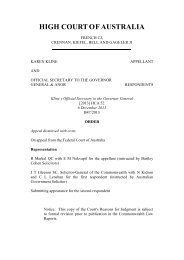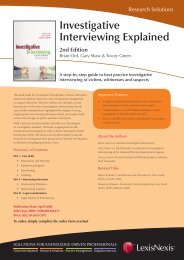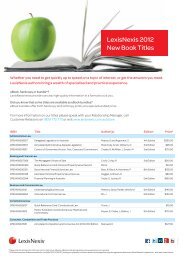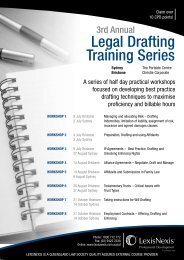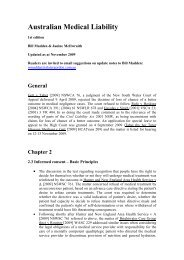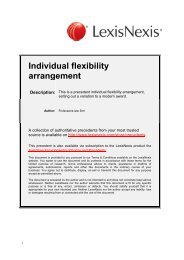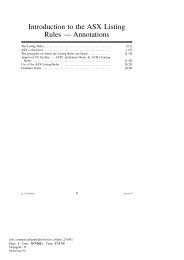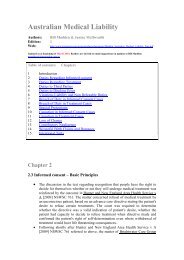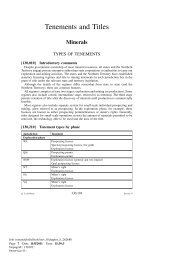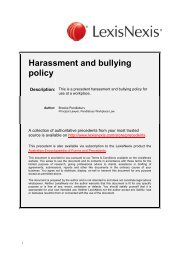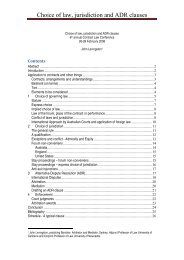Chapter 2 - LexisNexis
Chapter 2 - LexisNexis
Chapter 2 - LexisNexis
Create successful ePaper yourself
Turn your PDF publications into a flip-book with our unique Google optimized e-Paper software.
• Den Elzen v Harris [2008] WADC 106. Claim concerning management of<br />
hydrocephalus and whether outcome would have differed in any event. Note at<br />
[203]: “However, this is in my view a case where the damage would be the<br />
very sort of thing that would be likely to occur in the event of breach, so that<br />
an evidentiary onus would fall on the defendant to show an absence of<br />
causation.”<br />
• Christou v Minister for Health [2008] WASCA 214. Appeal from decision<br />
concerning intestinal perforation during course of total abdominal<br />
hysterectomy surgery.<br />
<strong>Chapter</strong> 12 Loss of chance – the aftermath<br />
• O'Gorman v Sydney South West Area Health Service [2008] NSWSC 1127.<br />
Consideration of content of duty of care owed by breast screening organisation<br />
to plaintiff; evidence supported the application of the causation principle<br />
stated by McHugh J in Chappel v Hart. This was not a case where<br />
metastasisation was likely in any event and the plaintiff had merely lost the<br />
chance of a better outcome. The events which occurred, i.e. the development<br />
of tumours in the plaintiff’s lungs and brain, occurred within the very area of<br />
risk which had been increased by the delay in diagnosis. No scope for the<br />
application of the principle in Rufo v Hosking. See [150] – [151].<br />
• State of New South Wales v Burton [2008] NSWCA 319. Difficulties of<br />
assessment of loss of chance, chance of some better outcome highly<br />
speculative. At [110], although the onus is on the plaintiff to identify the value<br />
of the lost chance, in accordance with the authorities referred to above, it is<br />
reasonable to err on the side of generosity, to avoid the negligent defendant<br />
obtaining too great a benefit of the doubt from uncertainty as to the causes and<br />
treatment of psychiatric conditions.<br />
<strong>Chapter</strong> 13<br />
13.10 100% reduction for contributory negligence<br />
• Adams by her next friend O'Grady v State of New South Wales [2008]<br />
NSWSC 1257. Alleged breach of duty by State in providing plaintiff with<br />
access to knife with which she stabbed and killed a teacher. As to contributory<br />
negligence: see [132] ff. “…in assessing relative culpability and respective<br />
share in the responsibility, the Court is entitled to come to a view that the<br />
contributory negligence should be assessed at 100% of the cause of the injury.<br />
For the reasons already given as to responsibility for the stabbing, duty of<br />
care, damages and causation, I would ordinarily assess the “contributory<br />
negligence” to be at 100% of the damage…”<br />
13.18 Medical liability cases regarding contributory negligence



